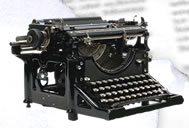In the fall of 1978 former TIME MAGAZINE
war correspondent Bill Walton remarked privately about how wildly inappropriate it was to cast the pretty-boy actor Ryan O'Neal in the roll as General James M. Gavin (1907 – 1990) for the epic war film,
A Bridge Too Far. Having dropped into Normandy in 1944 with a typewriter strapped to his chest, Walton witnessed first-hand the grit and combat leadership skills that made Gavin so remarkable. The attached
Yank article tells the tale of Gavin's teen-age enlistment, his meteoric rise up the chain of command and his early advocacy for a U.S. Army parachute infantry divisions.
Another article contrasting the Germans and the Japanese can be read here...
- from Amazon:
Gavin at War
Five days into Operation Market Garden, this hastily written notice was dispatched by a Stars and Stripes reporter on assignment with the allied airborne forces in war-torn Holland.
The seasoned war correspondent explained in the attached article as to why Operation Market Garden was such a disaster (and the censors let him) and why the next ambitious Allied parachute assault, Operation Varsity, would be different. Reminiscing about all that he saw of the famed parachute jump beyond the Rhine prior to being forced to turn-tail and bail out over English-occupied Belgium, he observed:
"...the C-46s come in and apparently walk into a wall of flak. I could not see the flak, but one plane after another went down. All our attention was on our own ship. It could blow up in mid-air at any moment. From the pilot's compartment came streams of stinging smoke."
Here is an account of the earliest days of the paratrooper branch of the U.S. Army. It is told by a man who claims the unique distinction of being the first volunteer to be recruited into the organization, Captain William T. Ryder (1913 - 1992). At this point in history the word paratrooper was not is use - the author uses the term "jump-fighter", instead.
An article from the Fall of 1943 that reported on the second campaign fought by the men of the 82nd Airborne Division, the invasion of Sicily:
"These air-carried forces were will be in a position to assist seaborne invaders not only by harassing the rear of the foe's first lines, but by standing in the way of his attempts to bring up his reserves...These men were also to show that an airborne force can assail and capture and enemy's strategic strong points, can man his bridges and his highways, can dominate his high-banked rivers and fight off his counterattacks."
The battle of the hedgerows as experienced by the paratroopers of the 82nd Airborne Division:
"They all had been fighting since D-Day. Compared with the obstacles at the beginning of their drive, the hill they had just taken was only a minor deal, but it was no push-over. "At some places," one paratrooper told me, "the fighting was so close the Krauts didn't even bother to throw their grenades, they just handed them over to us."
Attached is the concluding essay from a U.S. Army report written in 1986 concerning the spirited defense that was offered by the
101st Airborne Division
at the Battle of the Bulge.
"At Bastogne, well-coordinated combined arms teams defeated uncoordinated armored and infantry forces committed to an unrealistic plan."
Click here to read more about W.W. II parachute infantry...
Another article about this battle can be read by clicking here...
This 1941 article lays out the brief history of airborne infantry before the author begins to recall the origins, training and victories of the W.W. II German paratroopers:
"The origin of parachute usage in warfare is obscure. They were extensively employed in the Great war to land spies and saboteurs. It is also of record that in 1917 General [Billy] Mitchell tried to persuade General Pershing to permit him to form an experimental troop of parachute fighters. Thus Mitchell was probably the first man professionally to express the notion of paratroopers... It was in 1935 that Hitler ordered Goering to organize paratroopers...[In Germany] the parasoldier is an object of curiosity to the elders, of envy to the youth. He is bound to be questioned and bound to do a sales job in educating the public, as you would say."
With W.W. II just around the corner, the U.S. Army Quartermaster Corps' "subsistence laboratory" in Chicago was burning the mid-night oil trying to create a nutritious light weight ration with little bulk for the nascent paratrooper divisions.
